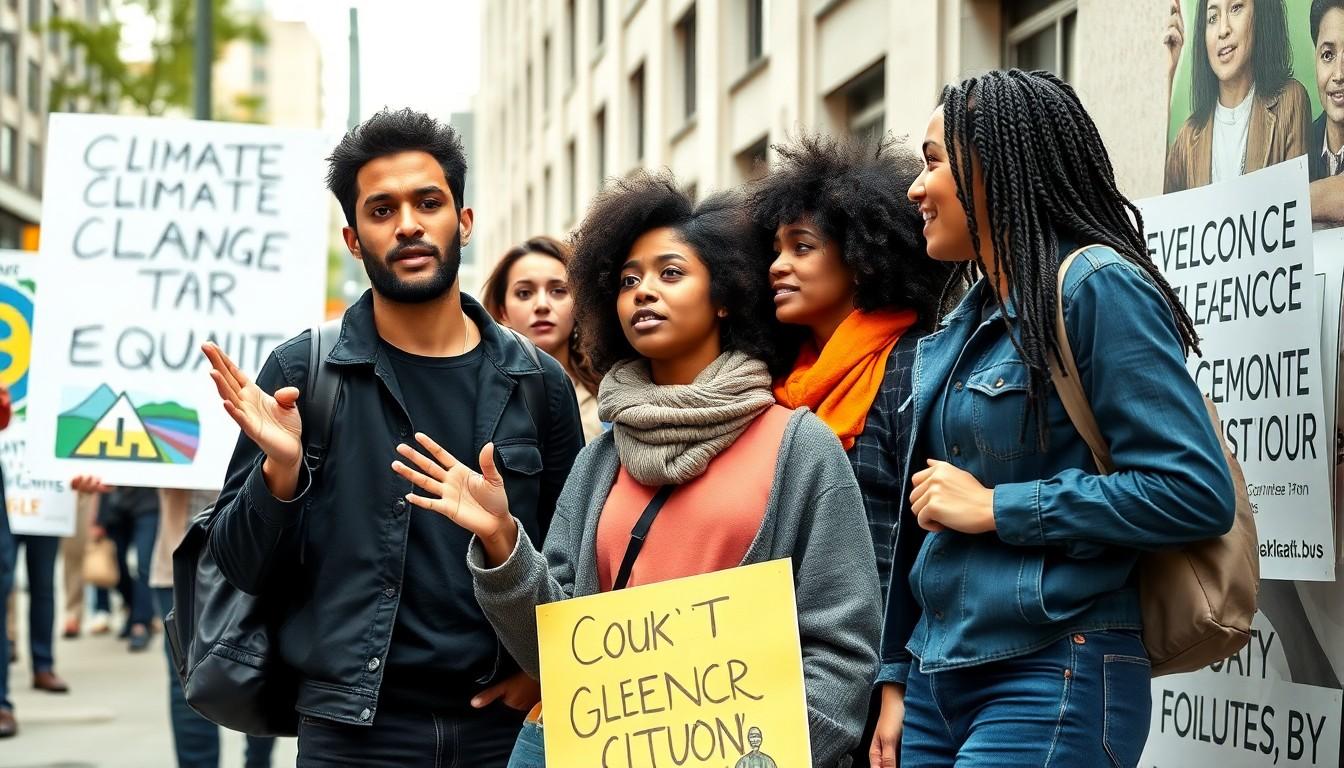Phone:
(701)814-6992
Physical address:
6296 Donnelly Plaza
Ratkeville, Bahamas.

In a world where social media debates can spark faster than a cat meme goes viral, understanding social and political issues has never been more crucial. From climate change to equality, these topics shape the very fabric of society, influencing everything from the morning coffee shop chatter to the evening news.
Understanding social and political issues proves essential in a fast-paced media environment. Conversations around topics like climate change and equality shape societal interactions and influence news narratives.
Social issues refer to problems that impact individuals and communities within society. They encompass a range of topics, including poverty, discrimination, and health care access. Such issues often affect quality of life and can lead to social unrest. Community engagement and awareness drive solutions to these challenges. Experts assert that addressing social problems requires collaborative efforts among governments, organizations, and citizens. Improved education and public policy initiatives frequently play key roles in mitigating the effects of social issues.
Political issues focus on matters related to governance, power, and public policy. Examples include taxation, immigration, and civil rights. Such issues influence the distribution of resources and affect citizens’ lives. Engaging in political discourse facilitates greater understanding and participation among the populace. Policies that address political issues often reflect societal values and priorities. Participation in democratic processes allows individuals to voice their opinions and impact decision-making. Political awareness fosters an informed electorate, crucial for ensuring responsive governance.

Social issues affect communities at various levels, significantly shaping conversations and policies.
Economic inequality creates vast disparities in wealth and opportunities. The gap between high-income earners and low-income individuals influences access to education and healthcare. According to the U.S. Census Bureau, the top 20% of earners held 52% of the nation’s income in 2022. Such inequalities often lead to social discontent and unrest. Addressing economic disparity requires collaborative approaches involving governments and organizations. Efforts like raising the minimum wage and enhancing social safety nets can mitigate these challenges. Prioritizing equitable policies fosters an inclusive economy where all individuals have a fair chance to succeed.
Racial discrimination manifests in multiple forms, including systemic inequalities in employment and criminal justice. Statistics show that Black Americans face unemployment rates nearly double that of their white counterparts. Such disparities perpetuate cycles of poverty and limit access to essential services. Addressing this issue necessitates comprehensive training programs targeting biases and discrimination in workplaces. Promoting diversity and inclusion initiatives can lead to fairer treatment. Advocacy for fair housing laws contributes to a more equitable society. Society benefits from recognizing and dismantling these systemic barriers.
Climate change represents a pressing global challenge affecting social structures. Extreme weather events disrupt lives and strain local economies. Data from the Intergovernmental Panel on Climate Change indicates that global temperatures have risen by 1.1 degrees Celsius since the late 19th century. Communities vulnerable to environmental changes face heightened risks to food and water security. Initiatives aimed at reducing greenhouse gas emissions are critical for sustainability. Engaging in renewable energy projects fosters resilience in affected communities. Individual and collaborative action remains essential to combat climate change effectively.
Current political issues shape governance and public discourse. Significant topics include voter rights, political polarization, and immigration policy.
Voter rights remain a critical issue, impacting access to the electoral process. Many states implement laws affecting voter registration and identification requirements. Data from the U.S. Census Bureau indicates that approximately 60% of registered voters participated in the 2020 election. Advocacy groups stress the importance of protecting voting rights to ensure equitable representation. Communities rally around initiatives aimed at expanding access, particularly for marginalized populations. Awareness campaigns seek to inform citizens about their voting rights and encourage participation.
Political polarization continues to deepen in the United States, affecting public dialogue. Surveys from Pew Research Foundation show that 85% of Americans view the opposing party unfavorably. This division often leads to a lack of compromise and increased hostility. Media consumption habits contribute to this phenomenon, as individuals tend to seek information that aligns with their beliefs. Promoting civil discourse may bridge the gap between differing viewpoints. Engaging citizens in bipartisan initiatives fosters understanding and reduces animosity.
Immigration policy remains a significant point of debate, affecting millions. Current legislation reflects contentious attitudes toward immigrants and asylum seekers. Data from the Department of Homeland Security reveals that over 1 million individuals obtained lawful permanent resident status in 2020. Advocacy groups push for humane immigration reforms, addressing the urgent needs of families separated by border policies. Local governments play a role by implementing inclusive policies that support immigrant communities. Societal attitudes influence these policies, highlighting the need for informed discussions surrounding immigration reform.
Social media significantly shapes social and political landscapes. Platforms like Twitter and Facebook act as spaces for discussion and activism. They enable users to share information rapidly. This immediacy can amplify voices that may otherwise remain unheard.
Activism often gains momentum through hashtags and viral content. The Black Lives Matter movement exemplifies this trend, illustrating how social media can mobilize communities toward social change. Engaging content drives awareness around critical issues, increasing participation in protests and advocacy efforts.
Furthermore, misinformation campaigns also emerge through these platforms. False narratives can spread quickly, leading to public confusion regarding essential topics like voter rights and climate change. This effect emphasizes the need for critical thinking when consuming news online.
Research indicates that social media influences voting behavior. Younger voters often engage with informative content through these channels. Engaging graphics or compelling video clips draw attention to political candidates and their platforms.
Political polarization appears on social media, resulting in echo chambers. Individuals are less likely to encounter differing viewpoints, often leading to intensified divisions. Engaging with diverse perspectives can help mitigate these divisions.
Moreover, community-building occurs as people connect over shared interests and concerns. Online groups foster discussions around local issues, bridging gaps in traditional political discourse. These digital spaces can lead to grassroots initiatives that drive social and political change.
Social media serves as a double-edged sword impacting social and political issues. Its role in activism, misinformation, and voter engagement creates both opportunities and challenges. Understanding these dynamics fosters more informed participation in societal dialogues.
Addressing social and political issues requires a collective effort from individuals and communities alike. Awareness and engagement are vital for fostering a society that values equity and justice. As social media continues to influence public discourse, it’s essential to navigate its complexities while promoting informed discussions.
The path forward lies in collaboration and advocacy, ensuring that marginalized voices are heard and respected. By actively participating in conversations about these pressing matters, society can work towards meaningful change and a more inclusive future.